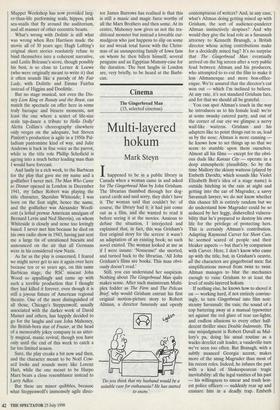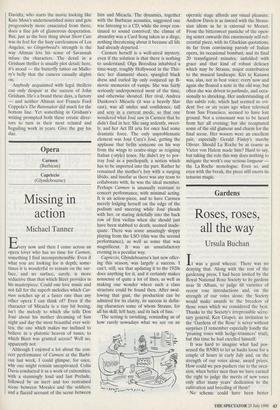Cinema
The Gingerbread Man (15, selected cinemas)
Multi-layered hokum
Mark Steyn
Ihappened to be in a public library in Canada when a woman came in and asked for The Gingerbread Man by John Grisham. The librarian thumbed through her dog- eared cards and said sorry, they didn't have it. The woman said that couldn't be: of course, the library had it; it had just come out as a film, and she wanted to read it before seeing it at the movies. Anxious to defuse the situation, I interjected and explained that, in fact, this was Grisham's first original story for the screen: it wasn't an adaptation of an existing book; no such novel existed. The woman looked at me as if I were insane: 'Nonsense!' she snorted, and turned back to the librarian. 'All John Grisham's films are books. This man obvi- ously doesn't read.'
Still, you can understand her suspicion. Nothing about The Gingerbread Man quite makes sense. After such mainstream Multi- plex fodder as The Firm and The Pelican Brief why would Grisham entrust his first original motion-picture story to Robert Altman, a director famously and openly 'Do you think that my husband would be a suitable case for euthanasia? He has started to snore.' contemptuous of writers? And, in any case, what's Altman doing getting mixed up with Grisham, the sort of audience-panderer Altman instinctively despises? And why would they give the lead role as a Savannah attorney to Kenneth Branagh, a British director whose acting contributions make for a decidedly mixed bag? It's no surprise that The Gingerbread Man eventually arrived on the big screen after a very public feud between Altman and his producers, who attempted to re-cut the film to make it less Altmanesque and more box-office- esque. We're assured that the director's cut won out — which I'm inclined to believe. At any rate, it's not standard Grisham fare, and for that we should all be grateful.
You can spot Altman's touch in the way he introduces us to his female lead: we're at some swanky catered party, and out of the corner of our eye we glimpse a nervy waif-like waitress. Grisham and his adapters like to point things out to us, lead us by the nose; Altman is more cunning — he knows how to set things up so that we seem to stumble upon them ourselves. Almost all his films — except for the obvi- ous duds like Kansas City — operate in a deep atmospheric plausibility. So by the time Mallory the skinny waitress (played by Embeth Davidtz, which sounds like Violet Elizabeth Bott's idea of a stage name) is outside hitching in the rain at night and getting into the car of Magruder, a savvy Savannah lawyer, we do not know whether this chance lift is entirely random but we do understand how Magruder could be so seduced by her leggy, dishevelled vulnera- bility that he's prepared to destroy his own life for the privilege of protecting hers. This is certainly Altman's contribution. Adapting Raymond Carver for Short Cuts, he seemed scared of people and their bleaker aspects — but that's by comparison with Carver. Here, I don't know who came up with the title, but, in Grisham's oeuvre, all the characters are gingerbread men: flat simplifications moved from twist to twist. Altman manages to blur the mechanics enough to raise Grisham to at least the level of multi-layered hokum.
If nothing else, he knows how to shovel it on — working hard, if not entirely convinc- ingly, to turn Gingerbread into film noir: steamy Savannah; the rain; the sound of a cop battering away at a manual typewriter set against the red glare of rear car-lights; and endless allusions to every other half- decent thriller since Double Indemnity. The one misjudgment is Robert Duvall as Mal- lory's pa, doing his usual routine as a wacko derelict cult leader, a vaudeville turn we've seen too often. But Branagh, with a subtly nuanced Georgia accent, makes more of the smug Magruder than most of his recent roles. Indeed, he infuses the part with a kind of Shakespearean tragic inevitability: all the legal vanities of his past — his willingness to smear and trash hon- est police officers — suddenly rear up and ensnare him in a deadly trap. Embeth Davidtz, who starts the movie looking like Kate Moss's undernourished sister and gets progressively more emaciated from there, does a fine job of glamorous desperation. But, just as the best thing about Short Cuts was its feel for the hazy carelessness of Los Angeles, so Gingerbread's strength is the way Altman lets his sense of Savannah infuse the characters. The detail in a Grisham thriller is usually plot detail; here, it's mood — the butterfly tattoo on Mallo- ry's belly that the camera casually alights on.
Anybody acquainted with legal thrillers can only despair at the success of John Grisham. He's a brand these days, a factory — and neither Altman nor Francis Ford Coppola's The Rainmaker did much for the bottom line. Yet something in Grisham's writing prompted both these erratic direc- tors to turn in their most relaxed and beguiling work in years. Give the guy his due.



























































 Previous page
Previous page